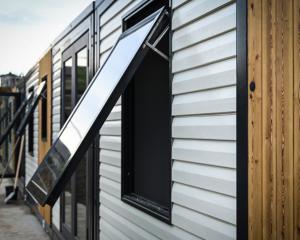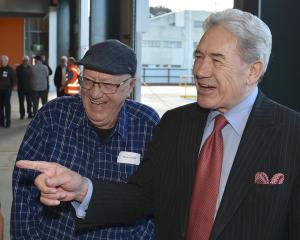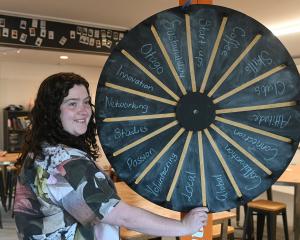When Clyde man Sean Boyd wanted to go and ''have fun in the snow'' back in 2006, he had a slight problem.
He could not ski or snowboard to a level that would excite him ''without dying in the process''.
''I have the balance skills of an upside-down bottle of wine that's been consumed.
''So you can imagine getting out there on skis or a snowboard was not a good idea for me. It would just be embarrassing,'' he said.
Looking out the window of his Clyde home at the snowy hills, Mr Boyd got the idea of building his own sled.
He chipped away building a prototype in his garage for about five years, testing it on the Old Man Range, near Alexandra, until he got it ''nailed''.
While it was a really cool and functional, the sled - built out of ''old bicycle bits and baking trays'' - did not look right.
So Mr Boyd took it to industrial design firm 4Design in Queenstown and told them he wanted it to look like Steven Spielberg and Enzo Ferrari ''got boozed up together and created a sled''.
He was thrilled with the result and Snolo Sleds Ltd was subsequently born.
The first sled was the carbon-fibre Stealth-X and he has since sold about 20, at a price tag of more than $3000.
The steering system allowed for sitting upright to steer or leaning into the corners like a grand prix motorcycle.
The idea behind the Stealth-X was to create a ''poster child of sledding'' and then to later release cheaper models, Mr Boyd said.
A new model was due out later this year and he believed the potential of the business was ''enormous''.
The United States was his biggest market - Americans spent $100 million a year on children's sleds - and he was looking at transferring manufacturing operations there from China next year.
''Americans love the designed in New Zealand aspect,'' he said.
He had even been approached by Disney, which was keen to use his sleds in films.
Asked what differentiated his sleds from others on the market, Mr Boyd said none of the others were as versatile.
Other sleds operated on hard-packed groomed snow, or powder snow, but nothing worked in transition.
He could take his sled to the top of the Old Man Range and sled from ''top to bottom'', through ice, deep powder and ''crusty stuff''.
His sleds revolved around design, high-tech materials and high performance, he said.
Joking that he had ''a million different jobs'' in his life, including being a police officer, probation officer, oyster farmer, cook, mechanic, steel fabricator, plastic injection moulder and gardener, Mr Boyd said he never really knew what he wanted to do.
But he had learnt something from each of his jobs and the skills acquired from the automotive, plastics and metal industries meant he knew how to make his own prototypes, saving him ''thousands of dollars''.
''Every single one [job] ended up being a very long apprenticeship for me to do this project,'' he said.
''It's the old saying, do what you're passionate about and make it your job,'' he said.
• University of Otago student Alice Marsh was on an exchange in Copenhagen last year when she got hooked on eating a ''super popular'' yoghurt, that was high in protein and low in fat and sugar.
''Us Kiwi girls ate it all the time,'' she said.
But when Miss Marsh returned to New Zealand, she found there was nothing on the market that was comparable.
She and business partner Hamish Macintosh decided to try to make it in New Zealand.
Initially, it was ''for selfish purposes'' - ''just because I wanted to still eat it'' - but then the Audacious business challenge came up and that spurred the pair into thinking they could make something of it.
Thykk Yoghurt was one of the top 20 ideas selected after round one of the student start-up challenge.
The final awards will be held in Dunedin next month.
When they got into the top 20, it made them realise there ''may be something in it''.
''We had no idea whether it was a good idea or not,'' Miss Marsh said.
They were aiming to sell the organic yoghurt by summer, testing it at farmers' markets initially.
It would be sold in glass jars.
Long-term, the plan involved ''conquering New Zealand'' and getting Thykk Yoghurt into supermarkets.
There was also potential in Australia.
''Thykk plans to revolutionise yoghurt as we know it, by offering a natural protein hit with next to no fat and hardly any sugar,'' Miss Marsh said.
Mr Macintosh, who studied economics at the University of Otago, is now completing a bachelor of property degree at the University of Auckland, while Miss Marsh is studying law and neuroscience.
Neither had ''yoghurt capability'' in their academic career, she joked, but they loved food.
Local support for the project had been ''huge'' and she was grateful for those people who were willing to give up their time to help with the pair's fledgling business.
Queenstown-based Simon Haslett was unable to reveal many details about Tapp Ltd, saying the company was close to launching its product.
However, he described it as an innovative technology company which was focused on ''breaking down barriers to make it easier for Kiwis to connect and do business with each other''.
''We are a group of people passionate about customer service and using the latest greatest technology in the best possible way.
''We aim to connect every household with good value, efficient services making everyone's life easier and more enjoyable,'' Mr Haslett said.
• The ANZ Flying Start business plan competition, run by Business.govt.nz, part of the Ministry of Business, Innovation and Employment, seeks out the best business plan from new or fledgling New Zealand enterprises and helps them put their plans into action.
All regional finalists must now submit a more detailed business plan. A second round of judging will then take place and 13 regional winners will be chosen.
From those, five will be invited to Wellington to pitch their business to a panel of experts.
The supreme winner will win $30,000 cash. Winners will be announced at a function in Wellington on October 30.












